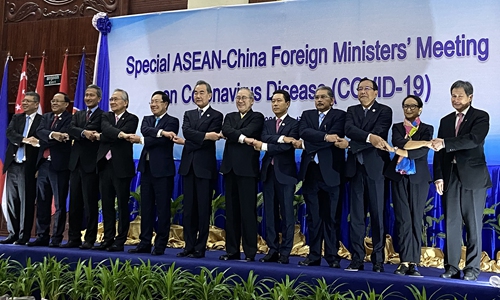HOME >> CHINA,SPECIAL-COVERAGE
China, ASEAN stand closer in virus fight
By Yang Sheng Source:Global Times Published: 2020/2/21 0:03:40
Two sides to seize cooperation opportunity in crisis

Chinese State Councilor and Foreign Minister Wang Yi (sixth from the left), foreign ministers from 10 ASEAN member states and ASEAN Secretary-General Lim Jock Hoi (right) join hands on stage at a foreign ministers' meeting between China and ASEAN on the COVID-19 in Vientiane on Thursday. Photo: AFP
China and the Association of Southeast Asian Nations (ASEAN) member states seized the opportunity in the crisis to strengthen their ties in fighting against the novel coronavirus (COVID-19) outbreak as the two sides agreed to strengthen cooperation and solidarity after a special meeting between foreign ministers on Thursday to discuss coordination efforts in fighting the epidemic.
China and ASEAN kicked off a Special Foreign Ministers' Meeting on the Coronavirus Disease in Vientiane, capital of Laos, Thursday to discuss coordination efforts in fighting against the COVID-19 outbreak, the Xinhua News Agency reported.
The meeting, co-chaired by Chinese State Councilor and Foreign Minister Wang Yi and Philippine Foreign Secretary Teodoro Locsin, was also attended by other ASEAN members' foreign ministers and ASEAN Secretary-General Lim Jock Hoi.
Chinese observers noted that this shows globalization and regional integration is essential for the international community to deal with massive cross-border crises together, as Wang proposed the two sides should turn the crisis into an opportunity and foster new points for cooperation and growth.
Wang said "ASEAN and China should push the economy to transform into an Internet and digital economy, enhance cooperation in areas such as digital commerce and mobile payment, and improve cities' management level to better cope with major urgent public incidents."
Xu Liping, director of the Center for Southeast Asian Studies at the Chinese Academy of Social Sciences in Beijing, told the Global Times on Thursday that the development of the China-ASEAN relationship is always "crisis-driven," such examples being the Southeast Asia financial crisis in 1998 and the SARS in 2003, all helping the two sides upgrade and deepen their cooperation.
So in the future, more infrastructure projects that can boost new commercial activities in the region, like digital commerce and online work platforms which China has fruitful experiences and technology, are likely to be offered to ASEAN, Xu predicted.
The meeting started with a rallying cry of "Stay strong, Wuhan! Stay strong, China! Stay strong, ASEAN!" by the ministers of China and the 10 member states of ASEAN in a joint photo session, Xinhua reported.
Li Haidong, professor at the China Foreign Affairs University, told the Global Times that "some of these neighboring countries don't have enough capabilities to handle such massive public health crisis alone, so if China is unable to contain the outbreak within its territory effectively, these countries would have to face the crisis directly and this could be a unimaginable disaster for most of them. So this has proven that China and ASEAN are in the same boat."
A video showing Chinese people mobilized to engage in joint efforts in fighting the virus was broadcasted at the beginning of the meeting, and it also shows support and encouragement sent from national leaders and the people of the 10 ASEAN member states to China.
In the video, a line stressed that "confirmed cases outside China account for less than one percent of the world's total."
Epidemics see no boundaries, Wang said at the meeting. Sharing a common future as brothers, China and ASEAN countries should effectively prevent the disease from spreading by carrying out closer and more active cooperation, so as to safeguard the health and lives of the people and to forge a closer China-ASEAN community of a shared future, he said.
Wang proposed that China and the ASEAN should take a long-term perspectives and establish long-acting cooperation mechanism. He proposed to establish a China-ASEAN public health emergency communication mechanism and a China-ASEAN anti-epidemic material reserve center to speed up the response against emergent health issues.
In a report published by Reuters on Thursday, Alfred M. Wu, associate professor at the Lee Kuan Yew School of Public Policy at the National University of Singapore, said in this meeting that, "China is promoting a message of friendship in ASEAN to counter attacks from the West that it has been handling the outbreak poorly."
But in fact, not only ASEAN member states but also other countries like Japan, Russia, Pakistan, Iran, the UAE, Britain, France, Germany, Italy and Israel, as well as the World Health Organization all have shown their support in different ways, and praised China's efforts sincerely.
A few Western countries, such as the US, are trying to inject competitive geo-political and ideological elements into the world's joint fight against the virus, which is a selfish move to push the reverse of globalization and is totally unhelpful for this joint fight at all, said Li.
"The COVID-19 crisis has once again proven that globalization and regional integration has already made the world a community with a shared future, and this trend is irreversible. It also shows urgency for countries to be more united rather than isolated from each other. To stand with China and be supportive is the correct and responsible choice at this moment," Li further said.
Wang said at the meeting that both China and the ASEAN should rationally deal with this epidemic and conquer panic. "The professional advice from WHO experts should be respected, and the normal exchanges and cooperation among trade and commerce personnel between the two sides should be restored comprehensively at an earlier date," he proposed.
Irrational travel and trade restrictions against China due to the epidemic situation will not only hurt China, but also damage the regional economy. While upgrading efforts to fight the virus, China and ASEAN also need to contain the damage of panic and overreaction caused by the COVID-19, Xu noted.
Newspaper headline: China, ASEAN closer in virus fight
RELATED ARTICLES:
Posted in: DIPLOMACY,FEATURE